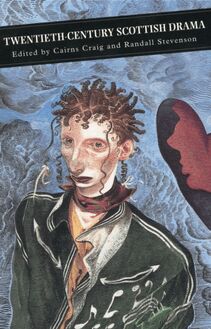-
 Univers
Univers
-
 Ebooks
Ebooks
-
 Livres audio
Livres audio
-
 Presse
Presse
-
 Podcasts
Podcasts
-
 BD
BD
-
 Documents
Documents
-
- Cours
- Révisions
- Ressources pédagogiques
- Sciences de l’éducation
- Manuels scolaires
- Langues
- Travaux de classe
- Annales de BEP
- Etudes supérieures
- Maternelle et primaire
- Fiches de lecture
- Orientation scolaire
- Méthodologie
- Corrigés de devoir
- Annales d’examens et concours
- Annales du bac
- Annales du brevet
- Rapports de stage
La lecture à portée de main
Vous pourrez modifier la taille du texte de cet ouvrage
Découvre YouScribe en t'inscrivant gratuitement
Je m'inscrisDécouvre YouScribe en t'inscrivant gratuitement
Je m'inscrisEn savoir plus
Vous pourrez modifier la taille du texte de cet ouvrage
En savoir plus

Description
Sujets
Informations
| Publié par | Canongate Books |
| Date de parution | 02 septembre 2004 |
| Nombre de lectures | 0 |
| EAN13 | 9781847675460 |
| Langue | English |
Informations légales : prix de location à la page 0,0400€. Cette information est donnée uniquement à titre indicatif conformément à la législation en vigueur.
Extrait
ALLAN MASSIE
The Death of Men
With an Introduction by Joseph Farrell
First, for Alison, then for friends of Roman days: Caitlin Thomas, Colm Thomas, Ses Hine, and in memory of Al Hine, writer and good friend, who died Autumn 1974
‘Man at present is a predatory animal … the sacredness of human life is a purely municipal ideal of no validity outside the jurisdiction … between two groups that want to make inconsistent kinds of world I see no remedy except force. I may add what I have no doubt said often enough, that it seems to me that every society rests on the death of men.’
Oliver Wendell Holmes
Contents
Title Page Dedication Epigraph Author’s Note Introduction Chapter One: Raimundo Chapter Two: Tomaso Chapter Three: Christopher Chapter Four: Raimundo Chapter Five: Tomaso Chapter Six: Raimundo Chapter Seven: Christopher Chapter Eight: Tomaso Chapter Nine: Raimundo About the Author Copyright
Author’s Note
IT WILL be apparent to most readers that the central events of this novel imitate the abduction and murder of Aldo Moro, and that the main character resembles Moro, and occupies a similar position in Italian politics. Beyond this, however, characters, relationships and events are purely imaginary. In particular I should like to stress that the Dusa family in no way resembles the Moro family, and that I have used only such aspects of the case as are public property. This is a work of fiction, with all the aspirations of a novel, and not a work of history or reportage. It would be improper were it to be treated otherwise, and it would distress me also if it were regarded as a roman à clef , which it, most emphatically, is not.
Introduction
THERE ARE still many mysteries surrounding the terrorist campaign, or campaigns, which shook Italy in the turbulent years stretching from the late 1960s to the early 1980s. The outrage which can be viewed as the opening act occurred on 12 December 1969, when a bomb exploded in a bank in Milan, killing sixteen people. Anarchists were arrested with suspicious speed, but it has now been established beyond all conceivable doubt that the perpetrators belonged to the Neo-Fascist Right, and that the unfortunate suspects were innocent victims in a police-political frame-up. The official conspiracy in this case provided Dario Fo with his plot for his angry farce, Accidental Death of an Anarchist . If chronologically the Right were first in the field, the Left soon spawned their own response. The publisher Giangiacomo Feltrinelli became so obsessed, with some reason, by the prospect of a neo-Fascist coup d’etat that he set up his own subversive network, the GAP (Partisan Action Group). The groupmay have provided the inspiration for other leftist formations, but Feltrinelli’s own role was limited. He blew himself up attempting to attach dynamite to an electricity pylon outside Milan.
The most important of the Left-wing groups, the Red Brigades, made their first appearance in August 1970. The first generation of brigatisti showed a certain moral scruple and were not responsible for any killings, but the organisation grew increasingly ruthless, and it was they who on 16 March 1978 carried out the kidnapping of the Christian Democrat statesman, Aldo Moro, an act which provided Allan Massie with the basic material for this novel. Moro was on his way to the Chamber of Deputies to vote for the new government based on the ‘historical compromise’ formula between his own party and the Communists which he had himself negotiated, but his car was ambushed, his five-man bodyguard slaughtered and he himself taken prisoner. Moro was to remain in the ‘people’s prison’ for fifty-five days while the police searched the length and breadth of Italy for his place of captivity. He was finally killed on 9 May, his body dumped in the boot of a car which was left in Via Caetani in Rome, halfway between the headquarters of the Christian Democrats and of the Communist Party.
The symbolism of the terrorists’ choice of place to leave the body was unmistakable, but the overall aims of the campaign remain bafflingly imprecise. Certainly for many militants it was an article of faith in those years that ‘the revolution’ was at hand, and in today’s Italy, with Silvio Berlusconi in power, there are many totally respectable lawyers, accountants, journalists, TV presenters and politicians of all shades who once marched, chanted, demonstrated, threw stones and charged police barricades to advance the revolutionary cause. They debated who would be dethroned and who admitted to power tomorrow, how hegemony would be organised, how the arts and creativity would flourish in a coming age of leisure, but the revolution itself was an innocent concept, not amenable of definition and not subject to analysis or dissection. The problem was that alongside those who occupied university buildings and shouted slogans were those who killed, wounded, kneecapped and abducted fellow humans.
For many, one of the most dismaying moments in those ‘years of lead’, as they were known, came at their close when certain ex-terrorists, already arrested and jailed, were permitted to participate in a television programme designed to analyse their motives, objectives, partial success and final failure. The outcome was disconcerting, leaving the Italian public gawking in disbelief as these figures emerged on the TV screens not as charismatic visionaries, fearless of God, careless of personal survival, heedless of the demands of compassion and resolute in their pursuit of the goals of the liberation of the oppressed proletariat, but as hesitant, semi-articulate individuals, notable for their command of an arcane jargon but incapable of formulating an ethical or political link between ends and means and unsure even of the nature and attainability of the objectives for which they had mounted the campaign. The sheer ordinariness of those who had, without pity or hesitation, shed blood and threatened the Italian Republic was hard to bear, or even credit. Here they were in flesh and blood stuttering that capitalism was systematic exploitation, bourgeois culture soulless, real socialismin Eastern Europe a fraud, the Italian Communist Party a clique of turncoat renegades, and then …? Where was the overall vision, or strategy? If the enemy were not a defined number of powerful individuals but a system which was greater than any total of parts and whose main crimes, in the eyes of late-Marxist theorists, were its dehumanisation and reification of human beings, how did the killing of individuals advance the cause of revolutionary Marxism?
Human judgement prefers solidity, but the imagination adores a vacuum. Allan Massie’s choice of title, from the writings of the jurist Oliver Wendell Holmes, suggests that his interests range beyond one historical period in Italian life towards the basis of the social contract itself. Trials of strength determine the nature of society, says Holmes, in a dictum as uncompromisingly brutal as any formulated by Robespierre or Lenin, but the course of Massie’s novel demonstrates the cost of strategies based on force. Many will be intrigued by the judgement delivered by Raimundo in this book that modern terrorism is different in kind from any preceding model since it aims not at something measurable or identifiable, like the independence of a people or the toppling of a tyrant, but at something more amorphous, intangible and imprecise, like the betterment of the human condition.
Allan Massie is not the first novelist to take as starting point a state of moral bewilderment, a mixture of uncomprehending awe, fascination and repulsion aroused by those who love their fellow man so deeply that, in the pursuit of universal love and fraternity, they plan in cold-blooded tranquillity to tear apart human flesh. Modern terrorism originated in nineteenth-century Russia, and immediately Dostoevsky and Turgenev were enthralled by the ambiguity of the terrorist figure. Perhaps the very archetype of the ethical terrorist was Ivan Kaliayev, dispatched to assassinate a member of the Czar’s family but unable to throw the bomb when he saw the prince’s wife and children seated in the car beside him. He had no objection to murder as such, and indeed became one of history’s first suicide bombers when he later trapped the prince on his own. This figure, and the terrorist in general, came to haunt Albert Camus, who made him the hero of his play, The Just , and it may be this work by Camus which Massie’s Bernardo is reading while in hiding in the Abruzzi. Conrad’s The Secret Agent remains the most deep and probing of all novels featuring a terrorist, but later, in 1984, Doris Lessing wrote a novel uncompromisingly entitled The Good Terrorist , while Graham Greene in The Honorary Consul (1973), a work of fiction whose shadow hangs benignly over Allan Massie’s novel, puzzled over the ex-priest who resents being called Father but who was the perfect amalgam of religious believer and revolutionary zealot.
There is no ambiguity in Massie towards terrorism as such, but nor is there any facile division into villains and heroes. It is not the least of the merits of this remarkable novel that it has taken to heart the injunction of G. B. Shaw in his introduction to St Joan that the writer’s duty is to make the Grand Inquisitor not only intelligible but even sympathetic. It is the enigma of motivation which more than any other factor accounts for the fascination which terrorists or violent revolutionaries have exercised over novelists. What drives a person to adopt terror as a tactic, especially if that person is of unusual moral sensibility? No doubt many terrorists are of the stuff of commonplace criminals, or were impressionable individuals intoxicated by the enthusiasms, however warped, of the moment, but others were pure idealists, motivated by beliefs they judge to be ethica
-
 Univers
Univers
-
 Ebooks
Ebooks
-
 Livres audio
Livres audio
-
 Presse
Presse
-
 Podcasts
Podcasts
-
 BD
BD
-
 Documents
Documents
-
Jeunesse
-
Littérature
-
Ressources professionnelles
-
Santé et bien-être
-
Savoirs
-
Education
-
Loisirs et hobbies
-
Art, musique et cinéma
-
Actualité et débat de société
-
Jeunesse
-
Littérature
-
Ressources professionnelles
-
Santé et bien-être
-
Savoirs
-
Education
-
Loisirs et hobbies
-
Art, musique et cinéma
-
Actualité et débat de société
-
Actualités
-
Lifestyle
-
Presse jeunesse
-
Presse professionnelle
-
Pratique
-
Presse sportive
-
Presse internationale
-
Culture & Médias
-
Action et Aventures
-
Science-fiction et Fantasy
-
Société
-
Jeunesse
-
Littérature
-
Ressources professionnelles
-
Santé et bien-être
-
Savoirs
-
Education
-
Loisirs et hobbies
-
Art, musique et cinéma
-
Actualité et débat de société
- Cours
- Révisions
- Ressources pédagogiques
- Sciences de l’éducation
- Manuels scolaires
- Langues
- Travaux de classe
- Annales de BEP
- Etudes supérieures
- Maternelle et primaire
- Fiches de lecture
- Orientation scolaire
- Méthodologie
- Corrigés de devoir
- Annales d’examens et concours
- Annales du bac
- Annales du brevet
- Rapports de stage















